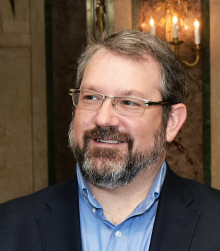So What’s NIMH’s New Director Really Like?

The rumor mill was just churning. Everywhere I turned, people wanted to know. “Who will it be?” “I heard it will be a woman!” “Is it true that it is going to be a Ph.D.?”
The National Institute of Mental Health (NIMH) directorship had been recently vacated by Dr. Thomas Insel, who spent over a decade at the helm when he left to join Google in the Bay Area. The keen interest came from all areas—yes, researchers, but it came from other academics, too, as well as advocacy groups and professional organizations.
I was attending APA’s IPS: The Mental Health Services Conference in New York in October 2015 when the email from Dr. Francis Collins’ office came in: “The National Institutes of Health (NIH) director wanted to talk to me on the phone. Might I be available?” I could not imagine what this was about. But the director wanted to ask me to serve on the search committee to identify the next NIMH director. As I absorbed the question, I realized that as president-elect of APA and a member of the NIMH Advisory Council, it made sense that he was reaching out, seeking input from the Association that represents psychiatry in this fine country.
The process was rigorous and thoughtful. The committee, ably chaired by Drs. Nora Volkow and Walter Koroshetz, was charged with reviewing the robust set of applications, selecting a subgroup for interview, and sending a few names to the NIH director for consideration. The process would take the better part of nine months.

Joshua A. Gordon, M.D., Ph.D.
I was thrilled when Dr. Collins announced that Joshua A. Gordon, M.D., Ph.D., of Columbia University would be the next NIMH director (Psychiatric News, September 16). There were many reasons for my enthusiasm. Of course, he is a brilliant and creative scientist. Goes without saying. But Josh has many other talents. He and I had gotten to know each other well when we worked closely to write a grant application for a research track for the residency at Columbia. After it was awarded, we worked shoulder to shoulder to get it off the ground and turned it into an exemplary program, often lauded by Dr. Insel for the quality of the recruited residents and the solid foundation they were provided, much of this due to Josh’s leadership.
Josh is collaborative to a fault, determined, hard working, and a wonderful, superorganized administrator. This last attribute became abundantly apparent to me when the time to prepare the competitive renewal for our grant came around. Josh had just been tenured and was planning to bicycle across the United States to celebrate. But, we had a grant to resubmit that supported our research-oriented residents. This was really important. I had some trepidation about how we were going to pull this off with him on the road, mostly incommunicado. Then I received his email with a work plan that knocked my socks off. I had been submitting grants for nearly two decades without the benefit of Josh’s work plan! We planned to complete the work in advance, assigning different pieces to ourselves and checking off the boxes as we progressed.
Of course, there are other key attributes. Importantly, he is positive and caring and has a terrific sense of humor, so critical for jobs in which frustration can be a daily (hourly?) event. He is interested in all sorts of research, not only wet-lab work, and supported trainees interested in areas ranging from bioethics to global mental health to computational neuroscience.
And that, I think, is the best thing about Josh. He is open-minded. As a basic science researcher, he is deeply curious about talk therapy and co-taught a course for residents with a psychoanalyst. How many wet-lab researchers would do that? The course was about how talk therapy might bring about changes in the brain, a critical acknowledgement that, yes, the brain is the substrate for talk therapies, and we need to understand how they work.
Josh is open-minded in other ways too. He is interested in new ideas and hearing the arguments for them. Should NIMH fund more services research? Does NIMH need to fund more clinical trials to bring new therapeutics to our patients? Should global mental health have more funding? Now, this does not mean he won’t ask pointed questions. He absolutely will. But pointed in a warm, avuncular way.
We are extremely lucky to have Josh at the helm of NIMH, and I can’t wait to see the great things he is going to do. Go, Josh! ■



